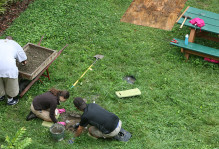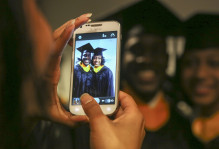More than the sum
I was recently invited to share some remarks at the volunteer appreciation event at WindsorMeade, and wanted to pass them along to you, cyber world!
I first started volunteering because of Burger King. My youth group at church had begun a regular Youth Work Day on Saturday mornings, where a bunch of us would pile into the back of our leader’s truck, head to the homes of people who needed repairs and yard work done (but couldn’t do it themselves), and wrangle tools we were unqualified to handle, like hedge trimmers and spackle knives. The idea was that the folks who lived in these homes could stay in them longer, and we’d get a taste of what we knew was good for us – to give to others. Though, as I mentioned, a huge motivator for me was the promise of heading to Burger King afterward, getting a Whopper Jr., and acting like I was cool with a crown on my head. Whatever it takes, right?
Though, of course, you can guess that much more than I expected actually happened in those work days. I got to know some of those people whose homes we went to, and I learned how much I liked them. They’d bring out a tray of lemonade, or offer a rest in the air conditioning for a few minutes, and during that time, I’d tell them about school while they told me about their lives. Quite a few of those folks became long-time beloved by those of us in the youth group, and I remember keenly feeling a special kind of grace from them in the midst of my unpracticed yard work skills.
For many of us, community service begins something like this. We hear of a need and respond to it. Peoples’ yards are overgrown, and we have hedge trimmers; kids are falling behind in math, and we have accountants with free time on Tuesday evenings; families are struggling to get enough protein after a parent lost one of her two jobs, and the synagogue does a peanut butter drive. Problem solved. Right?
In my work in the Office of Community Engagement, we do a lot of service that looks much like what I’ve described. Hundreds of students each year go on alternative break trips and build a house with Habitat for Humanity, or tutor kindergartners each week at Matthew Whaley, or prep and deliver healthy meals to our neighbors in public housing. And that solves the problem, sort of. A family gets a safe, stable and affordable house that they can call home. A child gets the attention that she longs for and needs to be able to progress at school. And a family has the energy they need to focus for the joys and challenges they face every day.
Our goal, though, is that our service goes a little deeper than addressing the challenges before us as a community by solving them as isolated problems, and that our students begin to see the bigger equation. So we make sure they understand the issue ahead of time by having them seek resources and to learn in some depth about that issue. In a place known for its beautiful housing, why do so many struggle to find a permanent home? Why do children need volunteer tutors in kindergarten, when schools are supposed to be fully staffed? What does hunger look like in our community? What policies and choices make each of these struggles a reality for so many of our neighbors and friends?
We take that educational process, and add to it their participation in community service, and conversation with others who are serving along with them to reflect on their experience. Through this process, our students start to see that bigger picture – the master equation, perhaps, or the root causes that lie behind the need for their service in the first place. Then the next time they build, tutor or serve, they might do so better. And ultimately, our hope is that this process equips them to take action on a bigger scale so that the isolated problems don’t have to be solved one by one, but ultimately we can create communities that come together to heal and bring wholeness so that all can reach their full potential, not just stop gaps so that no one falls through.
This may sound like a pretty academic approach. Just get the students to study the issues, talk about it, and keep going back, and boom! things change.
What we know, though, is that this equation of community service can’t be easily reduced to study + service + reflection = change. Because what keeps most of us going back is that elusive, and sometimes unplanned for, connection that comes about when we step outside ourselves to interact with others we might not otherwise have met. When people know that we take them as seriously as we take ourselves, and when we get to know them with honest curiosity, there’s a kind of secret math that makes that whole – the relationships we develop through service – greater than their sum.
For a while after college, I volunteered as a Writer in Residence for a community arts program in my neighborhood in Philadelphia. I have to confess to liking the hoity-toity sound of my title at the time, but what it looked like in reality was me, up in front of a room of fifth graders – some of whom had never written more than a partial sentence and were in fact, more interested in slamming each other up against the wall – grasping at how to teach them to write poetry. As I sought resources for this daunting job, I met with a man who had done similar work in area schools for years. He had actually written the book on it. So he recommended lots of resources to me – including that book he had written – and others that had writing prompts and poem starters. But perhaps most helpfully, he told me that I absolutely had to read Pedagogy of the Oppressed, by Paulo Friere, a man who was born in Brazil and developed critical pedagogy theory through his work as an educator around the world.
Maybe some of you have read it, too. But just in case, this is the part that blew my mind, and gave me helpful images and terms that helped me better articulate my understanding of what it means to “serve,” through the lens of education. Friere talks about how so often, educators become the “narrating subject” while students become the “listening object,” receptacles of knowledge who are expected to then be able to dish that exact knowledge back out. He calls it the “banking concept of education,” in which students – expected only to “receiv[e], fil[e] and stor[e] the information” are reduced to receivers of knowledge, not those who can explore it, mix it up or transform it in any way. And the outcome of this is that hierarchies between student and teacher are deepened.
What he proposes instead, is an approach focused on inquiry, where dialogue is central between the student and teacher, and where both are changed in the process. And the result is, as he says, “a constant unveiling of reality,” which helps people realize their “vocation of becoming more fully human.”
Of course, he says a lot more than that. But I bring these words to you today because for me, they touch on the soul of not just education, but also community service. I think it was brilliant for that poet to suggest that I read Friere, because the heart of his message isn’t only true about teaching. It points to how we should be interacting with each other, particularly when we’re in contact with people who are in some way different than us. If we do service right, with humility and curiosity, and looking for ways we can all change, service helps us become more in touch with reality, more connected to each other as we break down hierarchies, and it centers us in the deep pursuit of what it means to become fully human.
It puts us in touch with what in South Africa is known as Ubuntu – that people are people through other people, and that we can’t exist as humans without each other. Service isn’t just about the little acts we do, but about the big things that can happen – in our hearts and in our societies – when our vision and perspective is changed like this.
That’s what happened to me when I was hacking away at bushes at the homes of my fellow church members when I was a teenager. And that’s what happened to me in those Philadelphia classrooms, and later as one of the students happened upon me as I gardened in my front yard after class one day – and she continued to stop by and help me water and weed from time to time.
I’m betting that’s what’s happened to you, too, as you’ve been engaged in service with WindsorMeade. Along with so many others who have experienced the broadening that happens beyond what we might expect when we embark on this adventure of growth and love, I am happy to celebrate that with you.




No comments.
Comments are currently closed. Comments are closed on all posts older than one year, and for those in our archive.